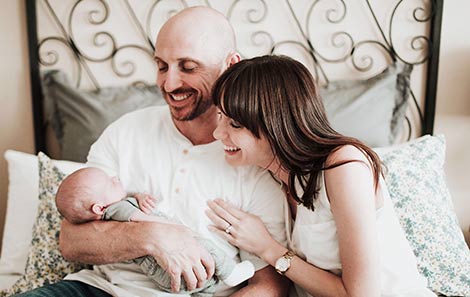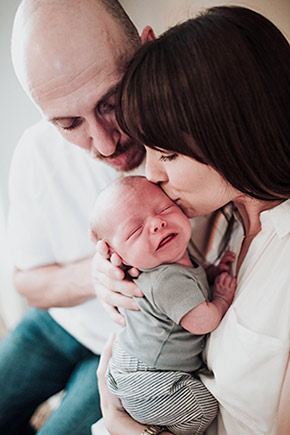 Most adoptions in the United States are open, semi-open, or somewhere in between. However, this is not mandatory for domestic adoption. Some private adoption agencies will only work with prospective adoptive couples who agree to open adoption, but you can always search elsewhere.
Most adoptions in the United States are open, semi-open, or somewhere in between. However, this is not mandatory for domestic adoption. Some private adoption agencies will only work with prospective adoptive couples who agree to open adoption, but you can always search elsewhere.
As you make this important decision on your adoption journey, weigh these options, and the potential benefits for you and your child. We’ll begin by reviewing the types of domestic adoption, and then share the benefits and drawbacks to each.
Types of Adoption in the US
Closed Adoption
There is no contact between the adoptive family and the birth mother. Even if the birth mother and adoptive parents got to know each other during the pregnancy, they would part ways after the baby is born. The adoptive parents are not obligated to provide the birth mother with updates throughout the child’s life. This type of adoption is uncommon today, but there are still some circumstances where contact might not be in the child’s best interest.
Semi-Open Adoption
The adoptive parents send the birth mother periodic updates through letters, pictures, or maybe even a private Facebook page. The birth mother learns about her child’s life and important milestones.
However, the birth mother generally does not make contact with the family. This is a great way for some families to meet halfway, especially if the adoptive parents and the birth mother live in different states. The adoptive parents and birth mothers decide how much contact they are comfortable with and can adjust their expectations as their relationship progresses. Often, a semi-open adoption transforms into an open adoption when the child grows older and expresses more interest in his birth history.
Open Adoption
Open adoption looks different for each family. Usually, the contact goes both ways. In addition to updates and pictures, the adoptive parents may also schedule periodic visits with the birth mother. The adoptive parents may exchange gifts with the birth mother and invite her to participate in important celebrations. The birth mother may have a special relationship with her child. The type and amount of contact are always negotiated between the adoptive parents and the birth mother.
You do have a choice about which type of adoption plan to pursue, and only you can decide what is best for your family. However, it’s important to consider the benefits of an open adoption plan before you make a decision.
The first of which is increasing your chance for a match. Most birth mothers wish to maintain some form of contact after placing their baby with the adoptive parents. Your waiting period may be significantly lower if you are open to this type of adoption. The benefits of open adoption don’t stop there. It can lead to a promising future for you, the birth mother, and the child.

Benefits of Open Adoption
The Adoptive Parents – You won’t be burdened with keeping secrets or facing questions you won’t be able to answer. You can be the gateway to helping your child understand his history and why his mother chose adoption by maintaining a relationship with the birth mother. You can support your child’s developing identity as he grows. A relationship with the birth mother gives you access to his current medical history, which is important for your child’s physical health.
The Birth Parents – Open adoptions are beneficial to the birth mother’s well-being. After the baby is born, birth mothers no longer face the trauma of never seeing their baby again or wondering if their baby is safe. This knowledge helps the birth mother feel confident about her adoption decision.
The Child – Your child will grow up knowing her adoption story. Positive contact with the birth parents can help your child become better adjusted and reduce behavior problems. She will have access to her birth history if she has questions and may have the opportunity to develop a special relationship with her birth parents. She will come of age with a fuller understanding of her identity and that her birth parents made their choices out of love.
Concerns About Open Adoption
There are some common concerns about open adoption. What if the birth mother oversteps the boundaries of our relationship? Will my child become confused about who her parents are? While these concerns are normal, they are mostly unfounded and can be worked through with your adoption professional.
An open adoption is not co-parenting. Your child will know that you are her parents, even if she has a special relationship with her birth mother. As the adoptive parents, you have full legal rights to your child. In most states, open adoption is an agreement of good faith rather than a legally binding contract. In extreme circumstances, the adoptive family may be court-ordered to communicate if they withhold the previously agreed upon updates like pictures or visitations. However, in most cases, the adoption agency helps the adoptive family work out any communication issues with the birth parents.
Pray for God’s guidance when choosing which type of adoption to pursue. Be honest and only agree to expectations that are realistic for you. It’s also important to be flexible. People and circumstances change. As your child gets older, you may find that you are open to ideas you had not considered before. Use your adoption professional for guidance. No matter what type of adoption plan you choose, you have the power to make decisions in the best interest of your family.

